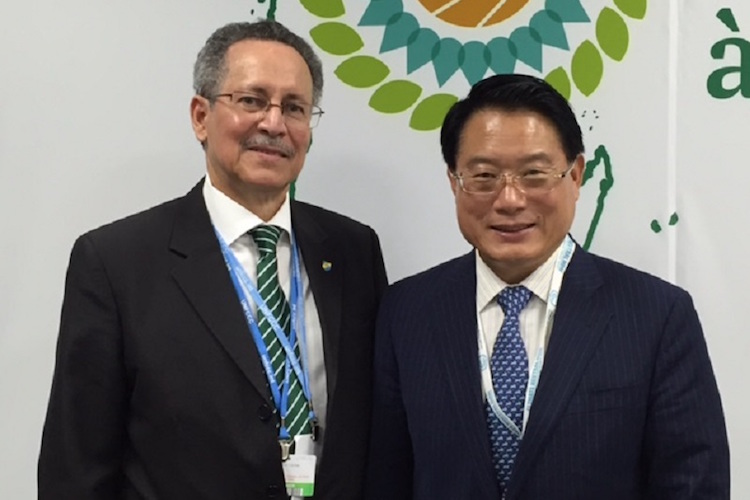By Dr. Patrick I. Gomes, ACP Secretary-General
Note: The following text is based on ACP Secretary-General’s address on the occasion of the 50th anniversary of the United Nations Industrial Development Organization (UNIDO) on 21 November 2016 in Vienna.
VIENNA | BRUSSELS (ACP-IDN) – UNIDO cooperation has been very fruitful in strengthening investment capacities in the 79 member states of the ACP Group, particularly to promote sustainable energy, value addition to commodities and development of small and medium enterprise.
In responding to the questions: How the ACP Secretariat is contributing and will be contributing to the promotion of 2030 Agenda for Sustainable Development and the Sustainable Developments Goals we are happy to highlight two principles that underlie the approach of the ACP Group to sustainable development.
Firstly, the eradication of poverty is not primarily the receipt of aid but the structural transformation of their economies so that value addition and equitable integration into global value chains are systemic and coherent.
Secondly in this process that unleashes human potential and optimizes sustainable use of natural resources, access to affordable, efficient and sustainable energy is a pivotal factor as so well identified in SDG 7. This also reinforces the importance of industrialization and the cooperation with UNIDO for an “inclusive and sustainable industrialization”.
In many ACP countries, agriculture remains the single most important sector in the eradication of poverty. (SDG1). It is also projected that this sector will remain a very critical source of employment for the foreseeable future in the rural communities of our member states.
Consequently, to ensure food security and meet the nutrition requirement of our population in ACP countries, agriculture and food security must be viewed from an entrepreneurial and business venture perspective.
As several studies have shown, the contribution of investment in agriculture to poverty reduction is two and a half times higher than in any other sector.
Within, Agenda 2030 and Sustainable Development Goals that relate to UNIDO and ACP mandates, Goal No 9 is the heart of UNIDO’s mandate and a basis for our cooperation by its recognition of “inclusive and sustainable industrialization” as a key strategy for development in connection with resilient infrastructure and innovation.
UNIDO’s new vision of “Inclusive and Sustainable Industrial Development” called “ISID” was established by Lima Declaration adopted at UNIDO General Conference in December 2013.
We acknowledge that UNIDO has launched a new strategy to implement ISID, the Pilot Country Programmes (PCPs), which aim to concentrate development efforts on the industrialization strategy of developing countries and scale-up investments through partnerships.
The two first countries selected for this exercise are two ACP countries, namely, Ethiopia and Senegal. We expect the programme could be extended to other countries, particularly ACP countries and commit to consider this under the 11th EDF Intra-ACP allocation for private sector development.
UNIDO is one of the institutions supporting the implementation of the “Samoa Pathway” for Small Island Developing States (SIDS) whether on sustainable energy via regional sustainable energy centers, SME development, trade standards compliance, innovation and regional integration.
We are convinced that industrialization will be the next challenge in ACP countries. The industrialisation will have at least two colors, “Green” and “Blue”. The “Greening” of ACP countries’ industrialization should take into account today’s reality of fight against Climate change. I would also add the need for “Blueing” the industrialization of our developing Countries and explore new frontiers, especially those of the Blue economy.
I now turn to some specific areas the ACP is addressing. The ACP Group has developed a Private Sector strategy, which focuses on empowering the Youth and the Women, especially in the youngest continent, which is Africa, with about 60% of the population being under 20 years old.
We are working on designing models and mechanisms, which would enable the largest number of entrepreneurs, generally in the urban informal or agricultural sector to benefit from a more enabling business environment, accede to affordable and predictable financing. With this, we aim at densifying our economies, building regional value chains and support the development of companies, which can become regional champions.
In this regard, and in respect of our Memorandum of Understanding, UNIDO and ACP Secretariat should continue to work together in the frame of respective mandates and programmes to support the sustainable industrialization and private sector development in ACP countries.
The comparative advantage of UNIDO is proven in the areas that support inclusive industries, particularly agro-industries, competitive and environmentally friendly industries.
The ACP Group will not spare any effort to see a new and stronger Tricontinental Organisation emerge. To this our founders were committed. We need effort and imagination, and courage, too, so that tomorrow we could transform the threats we are facing today, into assets that could serve as the basis for empowerment and sustainable development. In this ambitious goal we know the ACP and UNIDO will strengthen efforts in the service of ending poverty, inequality and economic injustice. [IDN-InDepthNews – 22 November 2016]
Note: This report is part of a joint project of the Secretariat of the ACP Group of States and IDN, a flagship agency of the International Press Syndicate.
Photo: ACP Secretary-General Dr Patrick I Gomes addressing the United Nations Summit for the adoption of the post-2015 development agenda. Credit: UN Photo/Amanda Voisard

